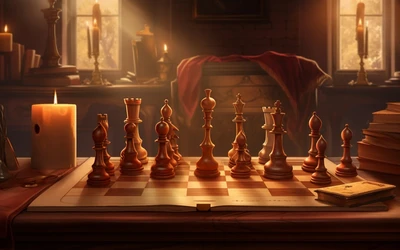
https://pixabay.com/users/huntlh-750213/
Chess Calculation: Try not to calculate anything! Magnus Carlsen example
The importance of being lazy! - An interesting example where Magnus Carlsen bypasses the opponent's calculationsHi all
One of my more controversial videos of all time on Youtube was this one:
https://www.youtube.com/watch?v=0O2EzU19fC8
I actually was there at the tournament venue that day and got to hear Magnus in the post-mortem commentary room and found his comments fascinating.
Magnus Carlsen only considered Qb5 for a very short time compared to his opponent basically saying what if White plays b3 - where is Black's counterplay? So he didn't calculate that stuff further and played Qd6 where the Queen is actually more central and in fact participated in a great tactic soon after.
I found it amazing that basically a lot of players do not brutally stop their analysis down a certain path with the signpost "No counterplay here for me - no need to look at this further" - but an intuitive player may be using such signposts all the time to be "lazier" in analysis. In computing, the term "Lazy evaluation" is actually very positive and means getting the same outcome but with far fewer resources used. There is actually no downside in terms of accuracy.
In computing as example, instead of trying to determine if the following is true or false:
(1=2) AND (100=100) AND (200=200) AND blah blah blah blah blah .....
Once you realise that (1=2) is false and the rest of it is ANDed - then no need to evaluate the rest of the expression. The result is FALSE - you know that straight away without having to calculate the rest of it.
In chess, here Magnus seemed to use very aggressive "lazy evaluation" and didn't even bother looking at White sacrificing the b2 pawn. He basically thought his queen could be left in a bad decentralised square and with not much counterplay - so given his position was not great there, didn't investigate anything else. Of course, you can get unstuck sometimes if you don't calculate a lot more stuff but overall, it kind of works for Magnus Carlsen a lot of the time to calculate it seems far less than other Grandmasters - and no wonder then he can crush them all even worse on the faster time controls especially bullet chess, where human Intuition is brought much more into the foreground.
By contrast, Luke McShane had calculated a maze of variations involving saccing b2 and getting some strong attacking pressure in some lines.
This difference of effort and time spent on the clock just served Magnus Carlsen big practical advantages - and later he was able to grind White down in an endgame.
I suppose that is the big advantage of more experience in chess - one's chess intuition gives the "Lazy evaluation" and one can actually focus more on what is relevant and important, and not lose so much time on the clock and mental energy analysing stuff which is largely irrelevant.
The epic example of intuition has to be this Mikhail Tal game who I am fondly studying games of at the moment:
Tal was apparently getting very confused trying to use the "analysis of variation" method. The variations apparently kept on piling onto each other and became pretty confusing to even the great Mikhail Tal.
Tal said this of Nxg7 later:
"....Despite my humanitarian education, was trying at this time to workout: just how WOULD you drag a hippopotamus out of the marsh? ...."
Tal was starting to think about Hippos in marshes! - this is far more useful than Kotov's tree of variations if things get complicated! The press later reported apparently he had accurately been calculating variations for about 40 minutes! But in fact Tal himself indicated he had played Nxg7 on intuition. The distraction of his mind wandering for 40 minutes was perhaps useful to his "gut instinct" to relax and just let the problem resolve itself naturally when he later gazed back at the board and didn't find it so complex after all.
Accepting the nature of the problem is also important here - the combinatory explosion of possibilities on the chess board can be overwhelming even for great chess players who can calculate variations very well. Especially for Tal who loved creating complications and using it as a weapon, then the role of intuition to navigate such complexity can be the most important tool of choice. We also need to accept our human nature and it's limitations. Humans tire and do blunder from frustration etc.
Takeaway points
- We are not computers and even computers make heavy use of "Lazy" methods sometimes like Caching or "Lazy evaluation". Sometimes it is just the overall result that counts and shortcuts can be super-healthy instead of something to feel guilty about.
- It is easy to calculate a pointless maze of variations - in fact, Kotov's "Think like a Grandmaster" seems like a good book for Russians to use to damage the chess of all Wester players because it encourages more of a "Brute force" evaluation of positions as though we are computers!
- If you do everything the exact opposite of Kotov's both philosophically and concretely to "Think like a Grandmaster" and actually treat yourself like a human instead of a computer, then one's eyes can open up to thinks like prioritising forcing moves, and making useful shortcuts such as "No counterplay for me here - won't calculate further". In fact, my course on tactics, "The complete guide to chess tactics" (https://kingscrusher.tv/chesstactics) takes the opposite philosophy and essentially indicates we need to make up for our weaknesses as human beings more and focus more on our strengths, rather than try and simulate Computers and electricity.
- You can save yourself a lot of time on the clock and a lot of mental energy consumption if you aim for "Lazy evaluation" of positions. But the experience of chess of course helps here to make your intuition more reliable without having to have concrete evidence for everything.
- Tal's Knight sacrifice was based on his intuition! He said so himself - in fact, he said he was getting very confused by the "Analysis of variations". Sometimes you just have to "go with your gut"!
Hope you enjoyed this blog :). Any likes and follows are really appreciated. Also, I also have some interesting chess courses at https://kingscrusher.tv/chesscourses to check out.
Cheers, K
You may also like
 thibault
thibaultHow I started building Lichess
I get this question sometimes. How did you decide to make a chess server? The truth is, I didn't. Nytik
NytikHow I Went From 2000 FIDE to 2000 FIDE in just 3 years (as an adult)
Maximal time wastage is a science, not an art FischyVishy
FischyVishyUnderstanding Chess Engines' Evaluations
This article will help the reader understand how to correctly interpret chess engine evaluations. CM Kingscrusher-YouTube
CM Kingscrusher-YouTubeThe Complete Guide to Chess Opening Principles -"King Safety Driven Development"
An unexpected perspective on the classic golden chess opening principles IM mostrovski
IM mostrovskiOn Carlsen blowing up the foundations
If we wish to undermine a building, we do not of course begin with the architectural ornaments, rath… CM Kingscrusher-YouTube
CM Kingscrusher-YouTube